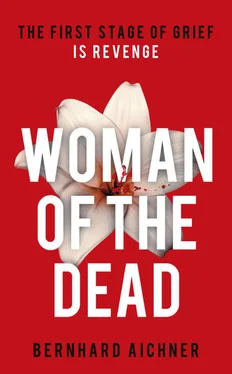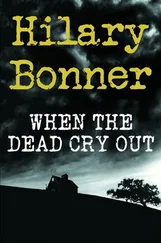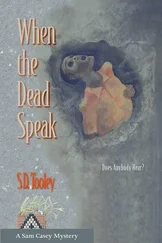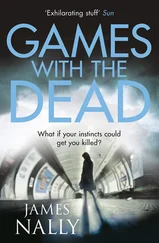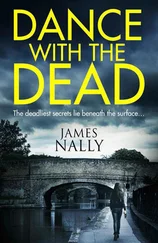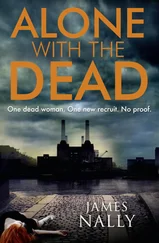Such marital dramas occur almost daily. Massimo is taking every opportunity to avoid his wife and come to help Blum instead. She gets all that he still has to give, and she is grateful not to be alone, to have someone other than Reza and Karl for company. Someone to put his arms round her. She is glad when his car turns into the drive, when he hugs the children, fools about with them for a moment in the garden, tries to make them laugh. Massimo is a friend – one of the good cops, like Karl and Mark. He disappears into the house with a smile, and comes back with a bottle of white wine and two glasses. Things are all in order, he tells her. She is financially secure; Mark had taken out life insurance. There’s nothing for her to worry about, he says, opening the bottle and pouring the wine. Money for Mark’s death, thinks Blum. A lot of money. What a bloody awful world , she says, drinking her wine in long, thirsty gulps.
The children are asleep. Massimo has gone; he put the girls to bed, read them a story, and left, although he would have liked to stay and talk to Blum a little longer. She wanted to be alone in Mark’s study, sitting in his armchair, legs up on the desk just as Mark himself used to sit drinking wine in the earthenware goblets they had brought back from Greece; they liked drinking from those rather than more ornate glassware. The red wine flows down her throat, warming her. She relishes it, for the first time feeling a little of the weight lift from her heart.
Blum looks around the room, at his computer, his files, and a thousand other things lying just as he left them twenty-two days ago when he rode off. Everything here is waiting for him to come back: objects that want to be touched, tools that want to be used. Nothing in the study shows that he is dead, and Blum still hasn’t changed that. It is the first time that Blum has been back in this room; she had simply closed the door, almost as if to shut in what was left of him. The air that he breathed, his personal things, his films, the untidiness on which he insisted – his little bit of freedom, he always said. This room was his retreat, the cave into which he shut himself when he was working, or simply when he wanted to get away from the children. His personal preparation room, he used to say, laughing. The place where he sat and thought.
She has dealt with everything else. His clothes, his shoes she has either given or thrown away. She has emptied his cupboards. Only his study was still shut up’. The mere thought of clearing it out hurt. Now she is sitting here, drinking wine. Not in pain, not oppressed by her grief. She has it under control, she can sit here drinking her wine and waiting. She has been sitting here for over an hour now, surveying the room. She doesn’t yet dare pick anything up, open a drawer, remember more than will do her good at this point. She hesitates; she wants to but she can’t. She has time, she has the night ahead of her, and the cellar is full of wine. Two hundred bottles. The thought gives her courage. Another cork comes out. Tears are no longer important, not now. She raises her wine glass and drinks to him, to her husband, her happiness. She remembers the little things: his laughter in the bathroom in the morning, his jokes after the fourth glass of wine, the way he pretended to like DIY. He was so clumsy, he hurt himself so often because he didn’t pay attention, he really had no clue what he was doing. What a darling he was.
Summoning all her courage, Blum picks up his telephone. A little world opens up, his engagements, notes, games. Blum leafs through the records of his time, she smiles because he could be so childish and playful. A grown man, a police officer, playing Tetris. His fingers caressing the display. All those text messages he sent her over the years. Their love went back and forth; a kiss would often come from him only half an hour after they had parted, and then she would send one back. All the messages he sent are stored. What she said, what he said. Memories that do her good now. Blum continues to explore, she plunges in, she swims. She and Mark are on their own for almost two hours. But then Dunya arrives.
Blum opens the folder on his mobile which contains all his saved conversations. She really just wants to see what’s behind the icon; she doesn’t mean to pry. Suddenly, his voice is back again. Mark breathes and speaks. He is back, a little tap on Play and she can hear him. Talking to a woman, a stranger whom Blum doesn’t know. At first she doesn’t understand what the woman is talking about, what Mark wants to find out. She just hears his voice, hears the sympathy in it as he speaks to the woman cautiously, almost affectionately. Mark wants her to go on talking, he wants her to tell her story. Blum listens. Seconds pass, minutes. Blum sips her wine. She wants to know who this woman is, why he is talking to her, why she is frightened. She hears Dunya, and Mark trying to reassure her.
‘Leave me alone. Please. I haven’t done anything.’
‘You don’t have to be afraid of me.’
‘Leave me alone. Don’t touch me. Go away, please. Just go away.’
‘I want to help you.’
‘I haven’t done anything.’
‘I know that. I’m not here to take you anywhere. I told you, I only want to talk to you about what happened.’
‘Go away and leave me in peace. Please.’
‘I believe you. I believe what you said.’
‘I was talking nonsense. It was nothing. I was drunk.’
‘You were under the influence of medicinal drugs. Strong tranquillisers.’
‘Exactly. I was hallucinating. I made it all up.’
‘No, you didn’t.’
‘I did. So now go back to your cosy little world. You don’t want to stay around here. No one does.’
‘I can help you to find those men.’
‘No.’
‘Trust me.’
‘I said no.’
‘Why not?’
‘Because you’re a man.’
‘I’m a police officer.’
‘I’ve been to the police already. I told you all about it, I begged and pleaded, and you ignored me. You put me in a hospital bed and shook your heads over me.’
‘I’m sorry that happened. Honestly. I know we ought to have taken it all far more seriously. We shouldn’t have doubted your story for a second.’
‘You should have helped me then, but it’s too late now. I’m fine here.’
‘Living under a motorway bridge? You don’t even have a roof over your head. Someone has to look after you.’
‘Who? You? Can I come and live with you? Will you get me a residence permit? Do you really want to look after me? If so then leave me in peace, that’s the only way you can genuinely help me.’
‘It will be all right.’
‘It won’t be all right until those men are dead.’
‘Please, let’s talk about it.’
‘If I talk to you I’ll die. You’ll stir up a wasps’ nest, and the wasps will get angry. You don’t know what that means, but I know the wasps will find me and silence me.’
‘It won’t come to that.’
‘Not so long as I stay here. No one will look for me here. My life is good now, a thousand times better than it was. I want to forget all that, don’t you understand? All of it.’
‘You mustn’t do that. You must remember every detail, and you must tell me all about it. Then I’ll find those men and make sure they’re taken to court and put behind bars, punished for what they did to you. I promise that nothing will happen to you.’
‘Why are you doing this?’
‘Because I want to help you.’
‘You should have done that earlier.’
‘I had the whole city searched after you disappeared from the hospital.’
‘I was sober when you talked to me the second time.’
‘You weren’t giving me anything to go on. You just stared at the wall. What were we to do? In cases like this we’re bound to proceed in a certain way. There was nothing we could do but wait for you to be discharged from the hospital.’
Читать дальше
